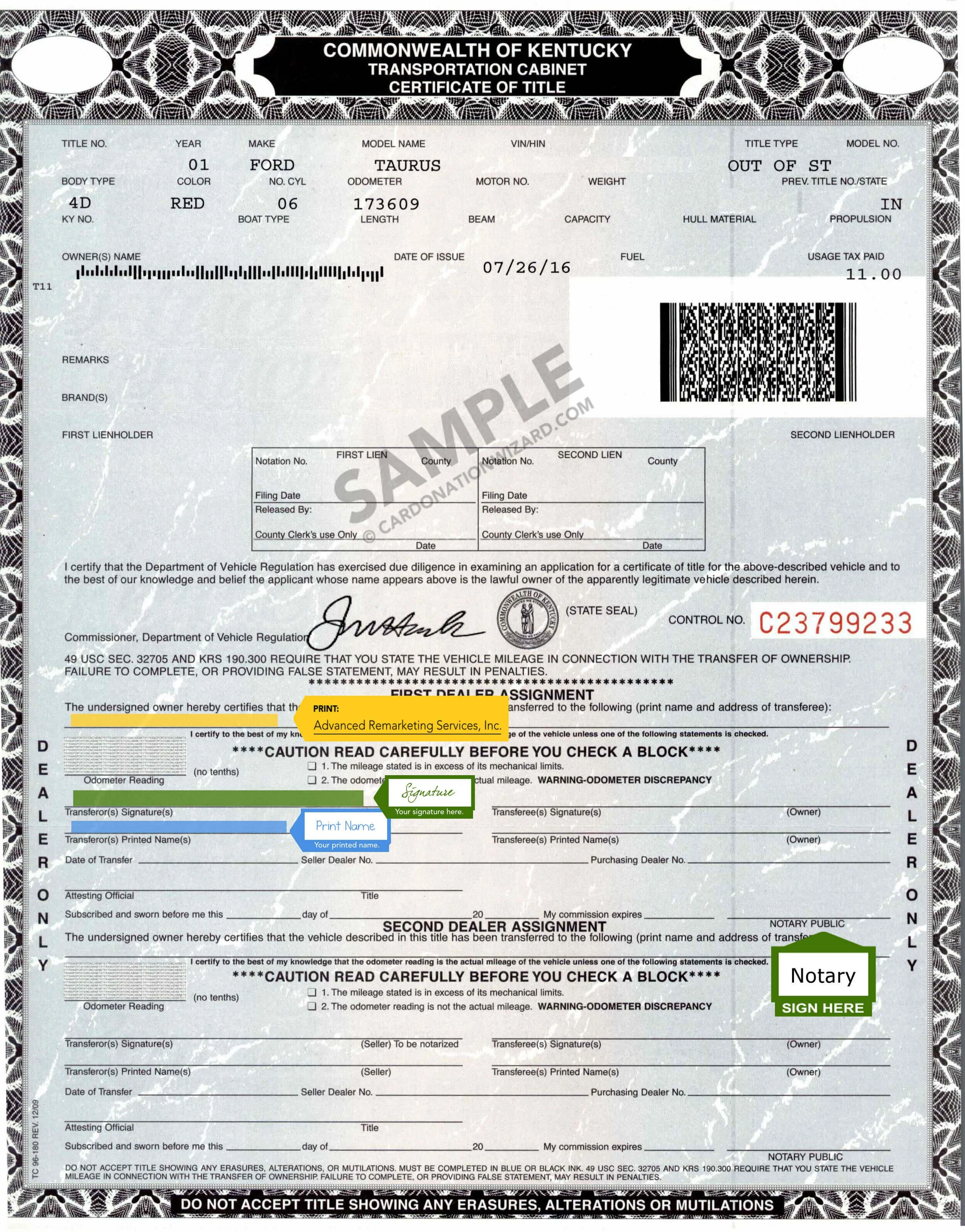Title washing is a common problem that we talk about often on our blog. It compromises your chances of getting reliable information regarding the past damage on a vehicle. As you shop for a used car, it’s imperative you understand the consequences of title washing. You also need to know that Kentucky title washing has its own set of dangers you must know about.
Because some states make it easier to conceal the history of a car, scammers commonly participate in the practice called Title Washing to disguise the car’s history by removing the flood branding from the physical title and making it appear clean at first glance.
Thankfully, flood damage will still appear on a detailed VIN check based on the car’s VIN number. We suggest getting one for any vehicle you intend to buy, especially if it currently holds or previously held a Kentucky title.
What is Car Title Washing?
When you buy a used car, you want all the facts concerning its history. If the vehicle has been involved in a significant accident or flood, you want that information. Flood damage causes electrical problems and corrosion that are difficult to fix. In addition, if the car has been involved in a collision, you might have structural damage that isn’t easy to spot. Overall, any of these situations compromises the dependability of your car.
State laws protect the consumer by supplying branded titles. For example, if you have a totaled car, the title becomes salvage branded, just like a flood-damaged vehicle receives a water-damage title in many states. Problem is, not every state uses the same branding.
Unfortunately, many sellers have found ways to manipulate the system. They use various processes to move the title to another state and seemingly remove the pertinent information you need to know. This is referred to as title washing.
Most of the time, title washing is done to remove that special flood branding we just talked about. Other times, title washing is performed to conceal who the lienholder is. Either way, it’s a dangerous practice which should be avoided at the first sign of it.
How Title Washing Works
Title washing occurs in multiple ways. The first approach is to move the vehicle to different states. Because each state has its own regulations regarding branding, it’s easy for scammers to accomplish their goals this way.
Another approach is to alter the title itself. The seller can sometimes make the physical changes necessary to the title document and remove branding evidence.
In other situations, it’s possible to apply for a new title without ever disclosing the history of the vehicle. Current laws which oversee branding rely on the owner or insurer to report any damage. If that person chooses to withhold those facts when applying for a title, then it might come through without the appropriate branding.
Thankfully, title brands like flood damage will still appear on a detailed VIN check based on the car’s VIN number. We suggest getting one for any vehicle you intend to buy, especially if it currently holds or previously held a Kentucky title.
Is Title Washing Illegal?
Absolutely! Title washing is considered fraud and is a federal crime. Many people have gone to jail, had to pay restitution, and been ordered to complete community service as a result of committing title washing. It’s not something you want to get involved in!
Kentucky Title Washing: What You Need to Know
Kentucky Attorney General Andy Beshear has warned consumers about the threat of title washing in the state. In fact, many flood-damaged cars from Hurricane Irma and Harvey have made their way to Kentucky so they could be titled as “rebuilt” cars and resold.
In Kentucky, getting a rebuilt title only involves minor repairs like cleaning the exterior and interior of the car and changing the fluids. This is far more lenient than other states such as Texas where any flood-damaged vehicle is considered non-repairable. Many other states have rigorous inspection processes for flood damaged vehicles.
To get a rebuilt title in Kentucky, the applicant must provide two photos of their vehicle and estimates to fix the damage. This includes any fees for changing the fluids and for cleaning. If the costs are less than 75 percent of the retail value, the DVR offers a new title.
Once the title has been moved to Kentucky, concealing its flood damage branding, it then gets transferred to another state that won’t recognize the rebuilt branding. This process makes the physical title appear clean, making it easy for sellers to pass it off without revealing its past damages.
Of course, that doesn’t stop the VIN check from showing the damage. This is why we always recommend running a VIN check before purchasing any vehicle, especially if it currently holds or previously held a Kentucky title.
Flooded Cars and Safety Concerns
Even if a car only took on a few inches of water, that damage could lead to disaster. While the vehicle might look fine from the outside, the internal damage is tricky to spot. The most common signs of flood damage might not be immediately apparent.
Internal engine damage
Internal frame damage
Rust located in unreachable areas
Water in the fuel system
Internal damage to electrical equipment
Protecting Yourself from Title Washing
There are some steps you can take to protect yourself from title washing, whether it occurred in Kentucky or elsewhere.
Pay attention
The first step is to trust your instincts. Don’t purchase a vehicle that has an open title. You want the name of the seller and the name of the title to match up. You can always ask for the seller’s ID to compare. If they don’t match up, question why.
In addition, you’ll want to listen carefully to any part of the story that doesn’t make sense. Why did the car spend 2 months in Kentucky, for example? Run a VIN check to confirm the facts.
Trust your mechanic
Have a qualified mechanic take a look at the car during a pre-purchase inspection. They know where to look to ensure there’s no structural damage or flood-related issues. If you can’t have a mechanic inspect the car, look under the carpets for rust or mud. You can also look in the trunk. Put your nose up to the floor to ensure it doesn’t smell like mildew and look for signs of water reaching unusual places.
Empower yourself
Finally, be prepared to walk away from the deal. It doesn’t matter how affordable the car is if you buy a piece of junk. If something doesn’t feel right, you want to trust your instincts and walk away. Another deal is probably just around the corner.
Unfortunately, scammers are always looking for a way to rip you off. Since there’s a loophole that allows Kentucky title washing, it’s a real threat you must be aware of. Perform due diligence and ensure that the next vehicle you purchase hasn’t been involved in a collision or flood.
Check out our blog for more resources on car title fraud and other selling schemes.
Dirt Legal offers VIN Checks to help you gather the facts before buying a new car. We can also obtain new titles for cars, motorcycles, and almost anything with wheels. Click the links to learn more about our services.
We are not attorneys. This article is not legal advice. Cover image source

















As many as 1 in 325 cars in the US may have a fraudulent title that has been washed.